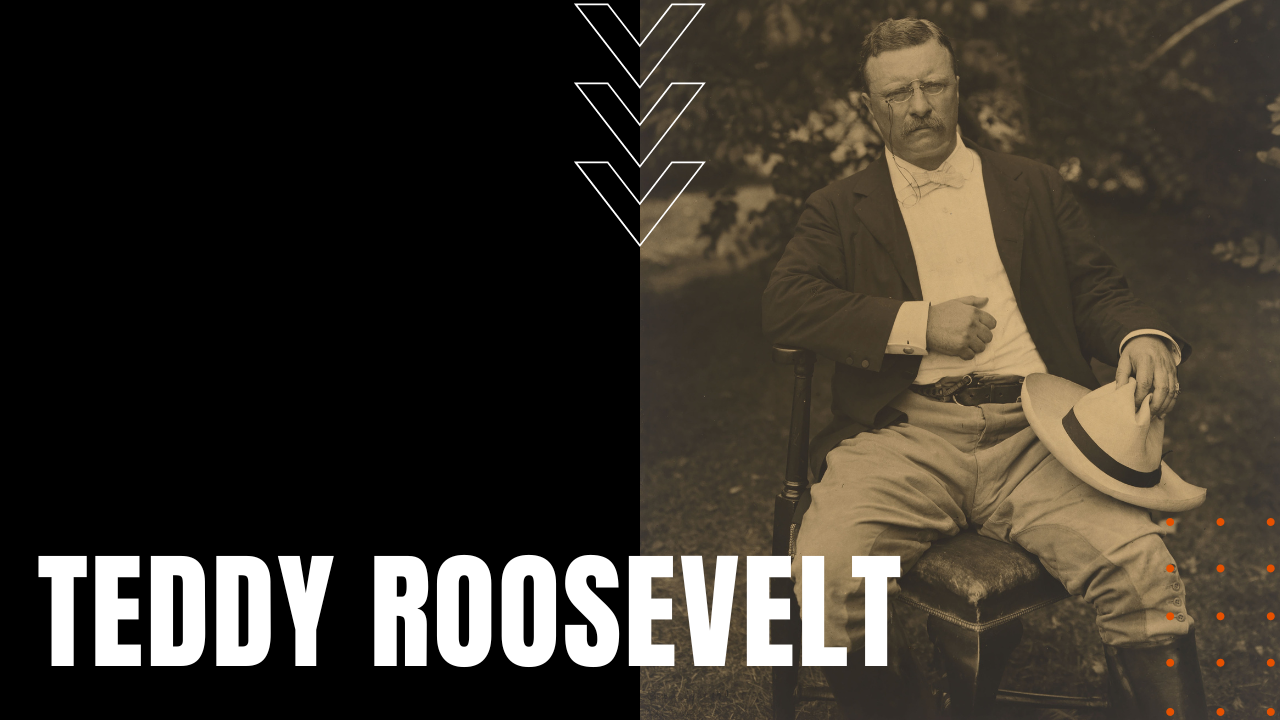Teddy Roosevelt

Born a sickly child in 1858 New York City, as a teenager, Teddy Roosevelt took up weightlifting and gymnastics, which transformed him into a strapping young man. Graduating Harvard College in 1880, Roosevelt studied law at Columbia University before his election to the New York State Assembly at age 23, losing both his wife and his mother on the same day in 1884, escaping overwhelming grief by spending the next two years at his ranch in the Badlands of the Dakota Territory.
Returns Home & Remarries
Upon his return to New York, Roosevelt married his childhood sweetheart, Edith Kermit Carow, raising six children over the coming years. Following an unsuccessful 1886 run for mayor of New York, President Grover Cleveland awarded Roosevelt a job at the U.S. Civil Service Commission, followed by President William McKinley’s choice as assistant secretary of the Navy, where Roosevelt’s participation with the
War Hero
Rough Riders made him a standout war hero following the end of the Spanish-American War—a image which won him the governor’s office for the state of New York. In 1900, after campaigning as William McKinley’s running mate—covering 24 states and some 21,000 miles by train—McKinley won the White House after a landslide victory over Democrats William Jennings Bryan and Adlai Stevenson.
New Image For Presidency
Following McKinley’s assassination on September 6th, 1901, 42-year-old Teddy Roosevelt transformed the public image of the presidency with his youth and vigor, becoming the first president of the Progressive Era, where he unfurled his “Square Deal” domestic program, promising to mediate between the conflicting interests of capital and labor, of isolationism and expansionism, of land conservation and development; all with the intent of stabilizing American society.
Trust Buster
Roosevelt’s two terms in office witnessed the successful breakup of a railroad monopoly under the Sherman Antitrust Act, while mediating an equitable settlement of a coal miners strike in Pennsylvania. He also set aside some 200 million acres as protected national forests, while preserving 86 million acres of ancestral Native American lands.
Wins Nobel Peach Prize
From a foreign policy standpoint, Roosevelt coined the motto “speak softly and carry a big stick,” which he applied liberally in his dealings in Latin America, including the successful secession of Panama from Colombia, which paved the way for the construction of the Panama Canal. He also successfully meddled in affairs outside the Western Hemisphere, winning the Nobel Peace Prize for his negotiations to end the Russo-Japanese War of 1904 to 1905, which included Japan’s acceptance of an ongoing U.S military presence in the Philippines.
Bull Moose Party
Avowing not to run for a third term as president, Roosevelt formed the Progressive or Bull Moose Party in 1912, after President William Howard Taft failed to live up to his promises for progressive reforms. Shot in the chest by a fanatic would-be assassin while campaigning for president in Milwaukee, Roosevelt quickly recovered, at the same time losing his third bid for the White House to Woodrow Wilson, due to Roosevelt’s division of Republicans during a three-party election cycle. He passed away on January 6th, 1919, after suffering a pulmonary embolism in his sleep, making Teddy Roosevelt, one of the most dynamic leaders in American history.
